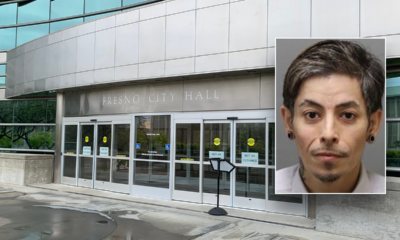Alaska
Royal Caribbean to fix Alaska cruise infrastructure issue – The Points Guy

Ah, scenic Juneau, Alaska — where the allure of lush forests, cascading waterfalls and majestic glaciers draws as many as 16,000 cruise passengers a day. The downside? The constant influx of visitors is putting a strain on local infrastructure.
Royal Caribbean Group — which operates Royal Caribbean International, Celebrity Cruises and Silversea Cruises — has partnered with Alaska Native corporation Goldbelt, Inc., to eliminate the problem of slow, unreliable Wi-Fi in port by bringing Starlink to several public areas and Juneau businesses.
You might think connectivity isn’t a big concern for people visiting the 49th state’s remote, nature-forward capital, which can only be reached by air or sea, but it turns out that isn’t the case. When the port is at maximum capacity, up to six ships can call there in a single day. With that many people in town, public Wi-Fi offered by local businesses is often difficult and frustrating to use for both visitors and locals.
“The number one complaint from this summer was a slow-down of internet speed during busy days downtown,” McHugh Pierre, Goldbelt’s president and CEO, said in a press release. “We are excited to collaborate with Royal Caribbean Group to explore a solution and add satellite internet capacity to town. This project will help locals and visitors have a better internet experience every day of the week.”
Installation began the week of Aug. 26 at the Goldbelt Tram Lower Terminal and will continue north on Franklin Street. The pilot program’s full range will be activated in the coming weeks. As each new hub becomes available, passengers, other visitors and locals will be able to connect for free and stay connected via one seamless network as they move about Juneau’s downtown.
Royal Caribbean isn’t new to Starlink, which was developed by Elon Musk’s SpaceX company. In 2022, the Royal Caribbean family of brands was the first to commit to adding Starlink to its ships for faster connections at sea that allow everything from surfing the internet and checking email to video calling and streaming.
Daily Newsletter
Reward your inbox with the TPG Daily newsletter
Join over 700,000 readers for breaking news, in-depth guides and exclusive deals from TPG’s experts
Cruise terminals where Royal Caribbean home ports its ships also provide connectivity for passengers, but this is the first time a cruise line has outfitted a large part of a downtown port area ashore with Wi-Fi.
“We are constantly striving to find innovative solutions to support our communities and enhance the travel experience for residents and cruise guests alike,” Preston Carnahan, associate vice president of West Coast destinations for Royal Caribbean Group, said. “Our new pilot program aims to alleviate internet congestion and provide additional bandwidth for locals while providing internet connectivity for our guests from ship to shore.”
The line’s statement also stresses the need for user feedback to evaluate the program’s effectiveness and determine whether similar initiatives will be rolled out in other ports.
For years, Juneau’s borough officials have heard complaints that the influx of cruise passengers detracts from everyone’s enjoyment of the city. On June 3, several major cruise lines — including Royal Caribbean, Carnival Cruise Line, Norwegian Cruise Line and others that are members of the Cruise Lines International Association — agreed to limit the total number of ships per day to five and the total number of passengers to 16,000 Sunday through Friday and 12,000 on Saturdays.
Want to learn more about Alaska cruises? Check out our other articles below.

Alaska
Sand Point teen found 3 days after going missing in lake

SAND POINT, Alaska (KTUU) – A teenage boy who was last seen Monday when the canoe he was in tipped over has been found by a dive team in a lake near Sand Point, according to a person familiar with the situation.
Alaska’s News Source confirmed with the person, who is close to the search efforts, that the dive team found 15-year-old Kaipo Kaminanga deceased Thursday in Red Cove Lake, located a short drive from the town of Sand Point on the Aleutian Island chain.
Kaminanga was last seen canoeing with three other friends on Monday when the boat tipped over.
A search and rescue operation ensued shortly after.
Alaska Dive Search Rescue and Recovery Team posted on Facebook Thursday night that they were able to “locate and recover” Kaminanga at around 5 p.m. Thursday.
“We are glad we could bring closure to his family, friends and community,” the post said.
This is a breaking news story and will be updated when more details become available.
See a spelling or grammar error? Report it to web@ktuu.com
Copyright 2026 KTUU. All rights reserved.
Alaska
Opinion: Homework for Alaska: Sales tax or income tax?

This is a tax tutorial for gubernatorial candidates, for legislators who will report to work next year and for the Alaska public.
Think of it as homework, with more than eight months to complete the assignment that is not due until the November election. The homework is intended to inform, not settle the debate over a state sales tax or state income tax — or neither, which is the preferred option for many Alaskans.
But for those Alaskans willing to consider a tax as a personal responsibility to help fund schools, roads, public safety, child care, state troopers, prisons, foster care and everything else necessary for healthy and productive lives, someday they will need to decide on a state income tax or a state sales tax after they accept the checkbook reality that oil and Permanent Fund earnings are not enough.
This homework assignment is intended to get people thinking with facts, not emotions. Electing the right candidates will be the first test.
Alaskans have until the next election because nothing will change this year. It will take a new political alignment led by a reality-based governor to organize support in the Legislature and among the public.
But next year, maybe, with the right elected leadership, Alaskans can debate a state sales tax or personal income tax. Plus, of course, corporate taxes and oil production taxes, but those are for another school day.
One of the biggest arguments in favor of a state sales tax is that visitors would pay it. Yes, they would, but not as much as many Alaskans think.
Air travel is exempt from sales taxes. So are cruise ship tickets. That’s federal law, which means much of what tourists spend on their Alaska vacation is beyond the reach of a state sales tax.
Cutting further into potential revenues, state and federal law exempts flightseeing tours from sales tax, which is a particularly costly exemption when you think about how much visitors spend on airplane and helicopter tours.
That leaves sales tax supporters collecting from tourists on T-shirts, gifts for grandchildren, artwork, postcards, hotels, Airbnb, car rentals and restaurant meals. Still a substantial take for taxes, but far short of total tourism spending.
An argument against a state sales tax is that more than 100 cities and boroughs already depend on local sales taxes to pay for schools and other public services. Try to imagine what a state tax piled on top of a local tax would do to kill shopping in Homer, already at 7.85%, or Kodiak, Wrangell and Cordova, all at 7%, and all the other municipalities.
Supporters of an income tax say it would share the responsibility burden with nonresidents who earn income in Alaska and then return home to spend their money.
Almost one in four workers in Alaska in 2024 were nonresidents, as reported by the state Department of Labor in January. That doesn’t include federal employees, active-duty military or self-employed people.
Nonresidents earned roughly $3.8 billion, or about 17% of every dollar covered in the report.
However, many of those nonresident workers are lower-wage and seasonal, employed in the seafood processing and tourism industries, unlikely to pay much in income taxes. But a tax could be structured so that they pay something, which is fair.
Meanwhile, higher-wage workers in oil and gas, mining, construction and airlines (freight and passenger service) would pay taxes on their income earned in Alaska, which also is fair.
It comes down to what would direct more of the tax burden to nonresidents: a tax on income or on visitor spending. Wages or wasabi-crusted salmon dinners.
Larry Persily is a longtime Alaska journalist, with breaks for federal, state and municipal public policy work in Alaska and Washington, D.C. He lives in Anchorage and is publisher of the Wrangell Sentinel weekly newspaper.
• • •
The Anchorage Daily News welcomes a broad range of viewpoints. To submit a piece for consideration, email commentary(at)adn.com. Send submissions shorter than 200 words to letters@adn.com or click here to submit via any web browser. Read our full guidelines for letters and commentaries here.
Alaska
Nome brothers summit Mt. Kilimanjaro, carry Alaska flag to third major peak

ANCHORAGE, Alaska (KTUU) – Two brothers from Nome recently stood at the summit of Mount Kilimanjaro in Africa, planting an Alaska flag at 19,000 feet above the African plains.
The Hoogendorns completed the seven-day climb — five and a half days up and a day and a half down — trekking through rainforest, desert, and alpine terrain before reaching snow near the summit. The climb marks their third of the world’s seven summits.
Night hike to the top
The brothers began their final summit push at midnight, hiking through the night to reach the top by dawn.
“It was almost like a dream,” Oliver said. “Because we hiked through the night. We started the summit hike at midnight when you’re supposed to be sleeping. So, it was kind of like, not mind boggling, but disorienting. Because you’re hiking all night, but then you get to the top and you can finally see. It’s totally different from what you’d expect.”
At the summit, temperatures hovered around 10 degrees — a familiar range for the Nome brothers. Their guides repeatedly urged them to put on jackets, but the brothers declined.
“We got to the crater, and it was dark out and then it started getting brighter out,” Wilson said. “And then you could slowly see the crater like illuminating and it’s huge. It’s like 3 miles across or something. Like you could fly a plane down on the crater and be circles if you want to. Really dramatic view.”
A team of 17 for two climbers
Unlike their previous expeditions, the brothers were supported by a crew of 17 — including porters, a cook, guides, a summit assistant, and a tent setup crew.
The experience deviated from their earlier climbs, where they carried their own food, melted snow for water, and navigated routes independently.
“I felt spoiled,” Wilson said. “I was like, man, the next mountain’s gonna be kind of hard after being spoiled.”
Alaska flag on every summit
Oliver carried the same full-size Alaska flag on all three of his major summits, including in South America and Denali in North America, despite the added weight in his pack.
“I take it everywhere these days,” Oliver said. “It’s always cool to bring it out. And then people ask, you know, ‘where’s that flag from?’ Say Alaska.”
When asked about his motivation for the expeditions, Wilson said “I guess to like inspire other people. Because it seems like a lot of people think they can’t do something, but if you just try it, you probably won’t do good the first time, but second time you’ll do better. Because you just got to try it out. Believe in yourself.”
Background and next goals
The Hoogendorns won the reality competition series “Race to Survive: Alaska” in 2023. In 2019, they were the first to climb Mount McKinley and ski down that season. Oliver also started a biking trip from the tip of South America to Prudhoe Bay with hopes of still completing it.
Kilimanjaro is their third summit. The brothers said they hope to eventually complete all seven summits, with Mount Vinson in Antarctica among the peaks they are considering next… all while taking Alaska with them every step of the way.
See a spelling or grammar error? Report it to web@ktuu.com
Copyright 2026 KTUU. All rights reserved.
-

 World1 day ago
World1 day agoExclusive: DeepSeek withholds latest AI model from US chipmakers including Nvidia, sources say
-

 Massachusetts2 days ago
Massachusetts2 days agoMother and daughter injured in Taunton house explosion
-

 Montana1 week ago
Montana1 week ago2026 MHSA Montana Wrestling State Championship Brackets And Results – FloWrestling
-

 Oklahoma1 week ago
Oklahoma1 week agoWildfires rage in Oklahoma as thousands urged to evacuate a small city
-

 Louisiana4 days ago
Louisiana4 days agoWildfire near Gum Swamp Road in Livingston Parish now under control; more than 200 acres burned
-

 Technology6 days ago
Technology6 days agoYouTube TV billing scam emails are hitting inboxes
-

 Denver, CO2 days ago
Denver, CO2 days ago10 acres charred, 5 injured in Thornton grass fire, evacuation orders lifted
-

 Technology6 days ago
Technology6 days agoStellantis is in a crisis of its own making




















